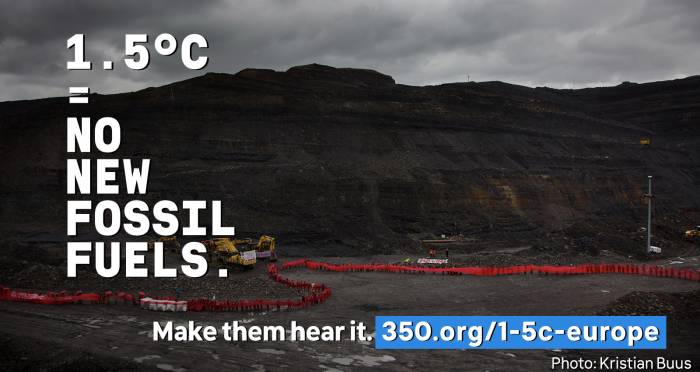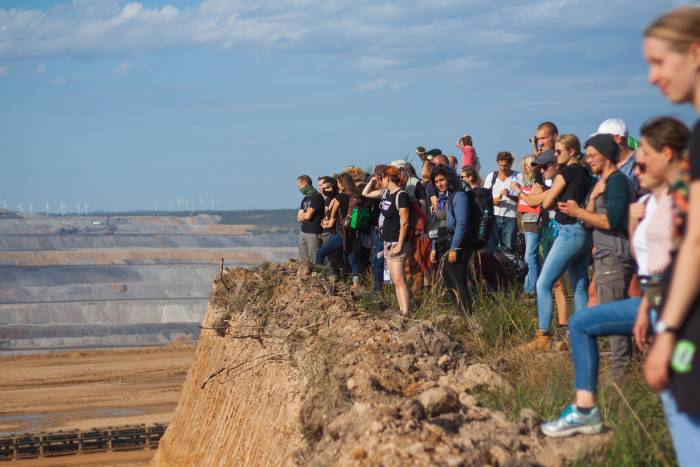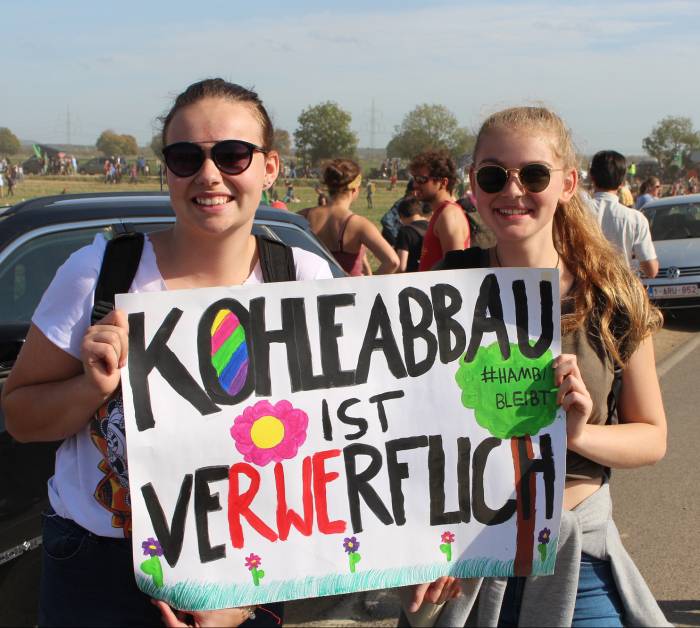The report released on Monday by the Intergovernmental Panel on Climate Change (IPCC) couldn’t be clearer: limiting global warming to 1.5 degrees means keeping fossil fuels in the ground.

There’s not much time left to make the radical changes that will be needed to avoid the most devastating impacts of climate change. That’s why the recent protests in the heart of Germany’s coal region, North Rhine Westphalia, were so important.
Just last weekend, on the eve of the IPCC report release, 50,000 people came together in solidarity to save the Hambach forest and take a stand against coal. The nearly 12,000 year-old forest has been under threat from coal company RWE who planned to cut down the forest to expand a nearby coal mine. The Hambach mine is one of the single biggest sources of carbon in Europe.
Initially, local police had tried to prevent the “Save Hambi, Stop Coal” demonstration from taking place, but a local court lifted the ban after a last minute appeal – that in itself is a victory for us. On the day, the crowd was victorious and defiant. After several hours of listening to speeches and bands, thousands of people streamed into the forest and joined Ende Gelände’s action, helping to build new blockades and treehouses and bringing a nearby coal digger to a halt.

Photo: Leon Enrique
More photos from the Save Hambi, Stop coal protests.
This was the culmination of weeks of mobilisations, with thousands of people heading to the area every weekend and an outpouring of support from across all parts of society — from church groups, school kids, and local communities to celebrities and private companies. The international response was also significant: the Pacific Climate Warriors sent a message of solidarity, after having visited the forest last year during COP23, and our team received more than 5,000 messages from around the world that we will deliver to those on the frontlines. The fight for Hambach forest has become part of a bigger climate justice movement across Europe and around the world.
Children in Tonga showing solidarity
Kinder aus Tonga schicken zum internationalen Aktionstag Soligrüße an #HambiBleibt 💜 Sie fordern ein Ende der Klimazerstörung, denn im Pazifik sind die Folgen des Klimawandels schon längst zu spüren. #HambacherForest #EndCoal pic.twitter.com/6KBXeS54FQ
— 350.org Deutschland (@350Deutschland) September 30, 2018
The urgent tone of the IPCC report is sobering – and when you think about the scope of the problem we face on a global scale, it’s hard not to feel that the fate of a small patch of forest in Germany is insignificant. Still, it’s crucial that we take stock of what we have achieved and celebrate our successes.
With the eviction of the occupation and the clearing season set to begin on October 15, it really wasn’t looking good for the forest. The court decision on October 6 was result of a lawsuit on nesting areas for Germany’s bat population, started by an environmental group, but it wouldn’t have been thinkable without the backing of a broad movement of people and the wide range of tactics that were employed in the lead up to this moment.
From legal challenges to the forest occupation, from forest walking tours led by locals to long-standing campaigns demanding that institutions divest from RWE and other fossil fuel companies – this wasn’t just a victory for the forest, it was a considerable defeat for the fossil fuel industry.

Coal giant RWE’s share price has plummeted after months of media reports and protests that helped to chip away at the social license of the company. We’ve managed to expose their contribution to the climate crisis and their relentless pursuit of profits, and the pictures and videos of the violent repression of those who stood in their way speak volumes. The tragic death of a journalist documenting this struggle was a low point for the movement. In the wake of the accident, it was jarring that the police, RWE and the local government pushed on relentlessly with the destruction of the treehouses and arrests.
Now that the clearcutting of the forest has been stopped until another court case reaches a decision (which is likely to take at least two years), RWE has been forced to reassess its plans to expand the Hambach mine and announced recently that it will scale back its excavation activities until at least 2020. That buys the movement crucial time to act on the message of the IPCC report, which in Germany’s case means building pressure for a strong commitment to phase out coal and continuing to go after the fossil fuel industry. The coal commission, which Merkel’s government has currently charged with developing a plan for nation’s phase out, is certain to attract more attention and face more public scrutiny in the wake of the #HambiBleibt protests. And now we know how good it feels to win, we’re already gearing up for the next round.